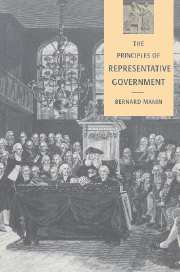
-
Select format
-
- Publisher:
- Cambridge University Press
- Publication date:
- March 2010
- February 1997
- ISBN:
- 9780511659935
- 9780521452588
- 9780521458917
- Dimensions:
- (228 x 152 mm)
- Weight & Pages:
- 0.55kg, 256 Pages
- Dimensions:
- (228 x 152 mm)
- Weight & Pages:
- 0.37kg, 256 Pages
- Subjects:
- Political Theory, Area Studies, Sociology: General Interest, European History after 1450, History, European Studies, Politics and International Relations
- Series:
- Themes in the Social Sciences
You may already have access via personal or institutional login- Subjects:
- Political Theory, Area Studies, Sociology: General Interest, European History after 1450, History, European Studies, Politics and International Relations
- Series:
- Themes in the Social Sciences
Book description
The thesis of this original and provocative book is that representative government should be understood as a combination of democratic and undemocratic, aristocratic elements. Professor Manin challenges the conventional view that representative democracy is no more than an indirect form of government by the people, in which citizens elect representatives only because they cannot assemble and govern in person. The argument is developed by examining the historical moments when the present institutional arrangements were chosen from among the then available alternatives. Professor Manin reminds us that while today representative institutions and democracy appear as virtually indistinguishable, when representative government was first established in Europe and America, it was designed in opposition to democracy proper. Drawing on the procedures used in earlier republican systems, from classical Athens to Renaissance Florence, in order to highlight the alternatives that were forsaken, Manin brings to the fore the generally overlooked results of representative mechanisms. These include the elitist aspect of elections and the non-binding character of campaign promises.
Reviews
‘Manin’s book is scholarly written, thought-provoking, a pleasure to read and challenging to modern representative democracy.’
Manfred Holler Source: Homo oeconomicus XV
Contents
Metrics
Altmetric attention score
Full text views
Full text views help Loading metrics...
Loading metrics...
* Views captured on Cambridge Core between #date#. This data will be updated every 24 hours.
Usage data cannot currently be displayed.
Accessibility standard: Unknown
Why this information is here
This section outlines the accessibility features of this content - including support for screen readers, full keyboard navigation and high-contrast display options. This may not be relevant for you.
Accessibility Information
Accessibility compliance for the PDF of this book is currently unknown and may be updated in the future.


